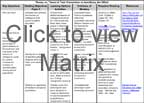Each state and district has their own guidelines for identifying and placing gifted students into programs. According to Florida Statutes and State Board of Education Rules 6A-6.03019, a student is eligible for special instructional programs for the gifted if the student demonstrates:
- Need for a special program.
- A majority of characteristics of gifted students according to a standard scale or checklist, (Broward County, Florida uses pre-screening tests such as the KBIT2 and Renzulli checklists for leadership and creative thought).
- Superior intellectual development as measured by an intelligence quotient of two (2) standard deviations or more above the mean on an individually administered standardized test of intelligence. With most testing instruments this equates to an IQ of 130 or above. Districts are also mandated by the state to develop alternative criteria that can be used to identify under-represented groups for gifted programs: Plan B. For the purpose of this rule, under-represented groups are defined as groups:
- Who are limited English proficient, or
- Who are from a low socioeconomic status family.
- Who are limited English proficient, or
These three criteria are all equally important in identifying students for gifted programs and creating a program that meets their needs. In addition, No Child Left Behind Act requires teachers to be “highly qualified” in order to teach gifted students, and, therefore, must have their state’s gifted endorsement. (This is addressed in detail in the online courses: Nature and Needs of Students Who Are Gifted, Curriculum Development for the Gifted, and Education of Special Populations of Gifted Students.)
 At this time, read and take some Creativity Tests from Indiana University.
At this time, read and take some Creativity Tests from Indiana University.
 Read Categories of Measures Used to Assess Creativity in School-Aged Children. Click on the daisy to access the handout. When you have finished reading, continue with the course content.
Read Categories of Measures Used to Assess Creativity in School-Aged Children. Click on the daisy to access the handout. When you have finished reading, continue with the course content. Read Can you measure Creativity at Schools and should we try? by Emer Beamer.
Read Can you measure Creativity at Schools and should we try? by Emer Beamer.
 Read Diverse Perspectives of Creativity Testing: Controversial Issues When Used for Inclusion Into Gifted Programs by Gay Lemons. When you have finished reading, continue with the course content.
Read Diverse Perspectives of Creativity Testing: Controversial Issues When Used for Inclusion Into Gifted Programs by Gay Lemons. When you have finished reading, continue with the course content.







